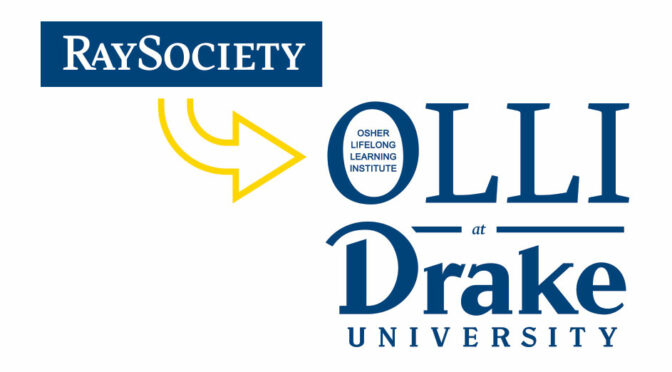Drake University’s lifelong learning organization known as the RaySociety received a $100,000 grant from The Bernard Osher Foundation to strengthen and expand its programming. As a result, the RaySociety was renamed the Osher Lifelong Learning Institute (OLLI) at Drake University. The name change signifies its inclusion as one of 125 lifelong learning institutes on university and college campuses across the country supported by the Osher Foundation.
“The RaySociety has been a recognized leader in the field of lifelong learning for nearly two decades,” said Tracy Beck, manager of OLLI at Drake University. “This grant along with our new national affiliation as an Osher Lifelong Learning Institute will allow us to enhance our programming and serve more people in the community. We will continue to be the same great organization, just bigger, better, and with a nationally recognized name.”
Beck said one of the benefits of joining the Osher Foundation is having access to a national network of resources, ideas, and colleagues to help strengthen its academic and social offerings. She said the grant funding will allow OLLI at Drake to increase its membership by providing scholarships for those who need help covering membership costs. In addition, funding will provide necessary technology upgrades to be able to deliver courses in both virtual and in-person formats.
The RaySociety was established at Drake in 2004 and named after Governor Robert D. Ray, who served as Iowa’s 38th governor and later in his career as the 11th president of Drake University, and his wife Billie Ray, former teacher and first lady of Iowa. The organization has evolved into a respected lifelong learning program offering more than 60 non-credit courses and 10 lectures each year taught by Drake faculty and community leaders.
“This is an exciting growth opportunity for lifelong learning at Drake,” said Drake University President Marty Martin. “As we transition from the RaySociety to an Osher Institute, we will always honor Governor and Mrs. Ray for their instrumental support and involvement. With Mrs. Ray’s enthusiastic support, we will continue to build upon their legacy as we expand course opportunities, grow membership, and better serve our community.”
There will be no changes to membership costs and class structure during the transition period. Membership to OLLI at Drake is $50. The membership year runs from July 1 through June 30. Course registration for the Fall 2021 semester will open Aug. 9. Important to note: OLLI is now located at the Alumni House. For more information about OLLI at Drake, visit drake.edu/olli.

